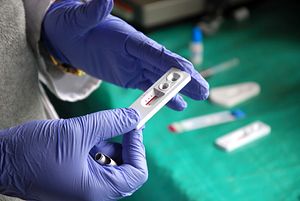An attorney and activist has filed a complaint with South Korea’s national human rights body to seek clarification on the current status of mandatory HIV testing of foreign workers, a policy that earned a rebuke by a UN committee earlier this year.
Benjamin K. Wagner, who previously worked in the country as a law professor, made the submission to the National Human Rights Commission of Korea (NHRCK) on Tuesday, World AIDS Day, asking for full transparency about which workers are tested for HIV/AIDS as a condition of their visa.
Wagner argues that the policy, which has seen HIV positive workers deported, is both discriminatory and harmful to the public health through the stigmatization of sufferers.
“The NHRCK complaint calls for a full investigation and transparency into all types of testing, deportation, et cetera — who gets it and why. UN members have directly asked the Republic of Korea (ROK) for this info recently and have received no answer,” Wagner told The Diplomat, referring to inquiries by the UN’s Committee on the Elimination of Racial Discrimination (CERD) in 2012.
The current status of the policy, which the government has justified on public health grounds, is hazy due to contradictory and inaccurate statements from official bodies in recent years. In 2010, the government announced an end to its long-held policy of tests for the E-6 and E-9 visa classes, which cover foreign entertainers and low-skilled migrants, respectively. But just last year, in official correspondence with the UN Human Rights Committee, South Korea acknowledged its testing of E-6 and E-9 visa holders. Responding to a complaint by a foreign English teacher, the country told the committee that its testing of certain foreigners, including teachers, entertainers and low-skilled workers, fell under the “legitimate aims to protect public health and maintain public order.”
South Korea introduced testing of foreign English teachers in 2007 after a child sex offender arrested in Thailand was discovered to have previously taught in South Korea. The country has on occasion deported foreign workers who have tested positive for HIV/AIDS. Confusion over the exact nature of current policy has been exacerbated by the fact that official bodies other than immigration, such as local education offices, have also required testing.
In May, CERD ruled that testing foreign English teachers for HIV was discriminatory and could not be justified on public health or other grounds. South Korea has not signaled any intention to abolish the requirement, although it previously announced in 2012 that it had no HIV-specific travel restrictions included in its immigration law.
Mi-ran Kwon, a representative of local activist group HIV/AIDS Human Rights Nanuri, said that the testing policy was negatively impacting the public health in South Korea.
“In Korea we have some of the most advanced medical treatment facilities in the world, but when it comes to stigma and discrimination against people living with HIV we are a backwards country,” she said. “The situation is incredibly bad for Koreans living with HIV and instead of getting better it is getting worse. Unfortunately, a lot of the blame is with the Korean government which refuses to properly educate citizens about HIV and refuses to stand up for the rights of people living with the disease.”































